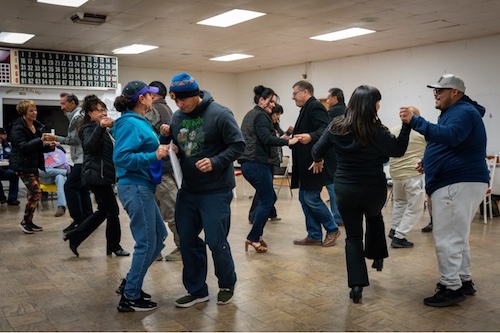 Some of the cast practicing a dance contest scene at the Knights of Columbus Hall.Over 60 community leaders, including business owners, elected officials, teachers, nurses, city and county employees, dance band members and people from all walks of life have been meeting regularly as Teatro del Cobre to practice for a performance of A Chicano Christmas. This is a bilingual play written by Patricia Cano and directed by Guadalupe Cano. The name, Teatro del Cobre, was chosen for the group because most of the participants have some kind of association with the copper mine. Either their grandparents, parents, siblings, aunts, uncles and cousins worked there or they themselves were employed by the mine at some point or they are current employees of the mine.
Some of the cast practicing a dance contest scene at the Knights of Columbus Hall.Over 60 community leaders, including business owners, elected officials, teachers, nurses, city and county employees, dance band members and people from all walks of life have been meeting regularly as Teatro del Cobre to practice for a performance of A Chicano Christmas. This is a bilingual play written by Patricia Cano and directed by Guadalupe Cano. The name, Teatro del Cobre, was chosen for the group because most of the participants have some kind of association with the copper mine. Either their grandparents, parents, siblings, aunts, uncles and cousins worked there or they themselves were employed by the mine at some point or they are current employees of the mine.
Those who attend the performance will experience the combination of teatro chicano with a pastorela (Nativity play) and will notice that there are no sets and very few props, unlike most 3-act plays. That is because Chicano theater was meant to go on the road. It originated in the 1960s, when the farmworkers were working to become organized. El Teatro Campesino, led by the actor and playwright, Luis Valdez, who is considered the father of Chicano theater, performed short plays in the fields of Delano, California, in order to encourage the farmworkers to organize and become part of a union to work for increased pay and better working conditions. According to Valdez, teatro chicano was meant to "affect, modify, change and give direction to society" and the performance of A Chicano Christmas is no different.
A pastorela is a centuries old Spanish language performance of the Christmas story that was first used to convert the indigenous people of what is now Mexico to Catholicism. This musical drama is meant to inspire and empower people as believers and followers of Christ.
The performance of A Chicano Christmas will take the audience back and forth, from the 1940s, the era of the pachucos, to the present and to a time before and after the birth of Jesus. According to Wikipedia, pachucos were members of a counterculture that emerged in El Paso in the late 1930s. Pachucos are associated with zoot suit fashion, jazz and swing music and a distinct dialect of Spanish that is known by many older residents of Grant County. The pachuco culture is alive and well today, as many cities including Los Angeles, Las Cruces and Juárez have pachuco festivals where young and old dawn the very expensive zoot suits and dance to oldies in the streets.
The one-time performance of A Chicano Christmas will take place on Sunday, December 8th at 2:00 in the afternoon at the Fine Arts Center Theatre on the Western New Mexico University campus. Admission is $5.00 per person and tickets may be purchased at the door. Doors will open at 1:00 and the doors to the theater will open at 1:30. Through music, dancing, Chicano culture and speech, humor, Biblical history and some magical realism, it is hoped that everyone will take home some kind of Christmas message.











